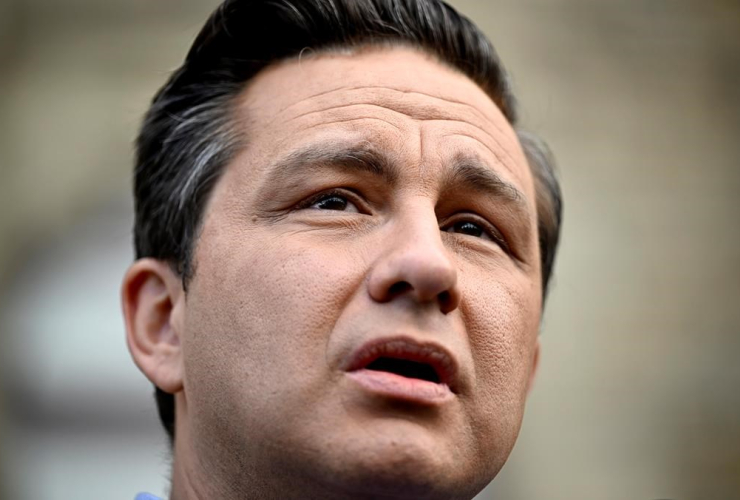Is Poilievre Bilingual? Unveiling The Truth Behind The Controversy
There’s been quite a buzz lately about whether Pierre Poilievre is truly bilingual. The question has sparked debates, memes, and even some heated discussions in Canadian politics. But what does it all mean? Is Poilievre bilingual or not? Let’s dive into this topic and uncover the facts behind the headlines. If you’ve ever wondered about Poilievre’s linguistic skills, you’re in the right place!
Before we jump into the nitty-gritty details, let’s set the stage. Pierre Poilievre is a prominent Canadian politician who has been making waves in the political arena. As a member of Parliament and a key figure in the Conservative Party, his bilingualism—or lack thereof—has become a focal point for many Canadians. This isn’t just about language; it’s about representation, identity, and the future of Canada’s bilingual policy.
Now, why is this such a big deal? Well, Canada is officially a bilingual country, meaning both English and French are recognized as official languages. For politicians, being bilingual isn’t just a bonus—it’s often seen as a requirement. So, is Poilievre up to the task? Let’s find out!
Read also:Vanessa Villanueva The Rising Star Shining Bright In The Spotlight
Table of Contents
- Biography: Who Is Pierre Poilievre?
- Why Is Bilingualism Important in Canadian Politics?
- Is Poilievre Truly Bilingual?
- Language Tests and Their Role
- Public Reaction to Poilievre’s Bilingualism
- What Do the Experts Say?
- The Impact on Canadian Politics
- Future Directions for Bilingualism in Politics
- Conclusion: What Does It All Mean?
- FAQs
Biography: Who Is Pierre Poilievre?
Let’s start with the basics. Pierre Poilievre is a well-known Canadian politician who has served as a Member of Parliament since 2004. Representing the riding of Carleton, he’s become a household name in Canadian politics. But who is he, really?
Early Life and Career
Pierre Poilievre was born on June 17, 1979, in Ottawa, Ontario. He grew up in a family deeply involved in public service, which perhaps shaped his career path. After completing his education, Poilievre entered the world of politics, quickly rising through the ranks. Here’s a quick rundown of his career:
- Served as Minister of State for Democratic Reform under Stephen Harper
- Acted as Minister of Employment and Social Development
- Became a prominent figure in the Conservative Party
Biodata
| Name | Pierre Poilievre |
|---|---|
| Date of Birth | June 17, 1979 |
| Place of Birth | Ottawa, Ontario |
| Political Affiliation | Conservative Party of Canada |
| Occupation | Politician |
Why Is Bilingualism Important in Canadian Politics?
Canada’s bilingual policy is more than just a legal requirement; it’s a cornerstone of the nation’s identity. For politicians, being bilingual isn’t just about speaking two languages—it’s about connecting with a diverse population. Here’s why bilingualism matters:
- It ensures equal access to government services in both official languages.
- It strengthens national unity by recognizing the cultural significance of both English and French.
- It enhances communication with constituents from different linguistic backgrounds.
In short, bilingualism is crucial for effective governance in a country as diverse as Canada.
Is Poilievre Truly Bilingual?
This is the million-dollar question. Critics argue that Poilievre’s French skills leave much to be desired, while supporters claim he’s making progress. So, where does the truth lie?
Language Skills Assessment
Assessing someone’s bilingualism isn’t always straightforward. It involves evaluating their ability to speak, write, and understand both languages. While Poilievre has shown improvement in his French, some argue it’s not enough for a national-level politician.
Read also:Kit Connor Relationship A Deep Dive Into The Heart Of A Rising Star
Challenges Faced
Learning a new language, especially as an adult, can be tough. Poilievre has faced criticism for his limited French proficiency, but it’s worth noting that he’s actively working on improving. The question remains: Is it enough?
Language Tests and Their Role
Language tests play a significant role in evaluating a politician’s bilingualism. These tests assess various aspects of language proficiency, including speaking, listening, reading, and writing. Let’s take a closer look at how these tests work:
- Speaking tests evaluate fluency and pronunciation.
- Listening tests assess comprehension skills.
- Reading tests measure vocabulary and grammar knowledge.
- Writing tests examine the ability to express ideas clearly in written form.
While these tests provide valuable insights, they’re not without limitations. Factors like nervousness or test conditions can affect performance.
Public Reaction to Poilievre’s Bilingualism
The public’s reaction to Poilievre’s bilingualism has been mixed. Some applaud his efforts to improve, while others remain skeptical. Social media has been a hotbed of discussion, with memes and jokes circulating widely.
Social Media Buzz
Memes about Poilievre’s French have gone viral, sparking both laughter and debate. While some view these memes as harmless fun, others see them as a reflection of deeper concerns about representation in politics.
Community Feedback
Feedback from French-speaking communities has been particularly important. Many have expressed the need for greater linguistic inclusivity in Canadian politics. This feedback highlights the importance of addressing language barriers in governance.
What Do the Experts Say?
Experts in linguistics and politics weigh in on Poilievre’s bilingualism. According to Dr. Marie-Claire Lambert, a linguistics professor at the University of Ottawa, “Bilingualism is a spectrum, and progress should be celebrated.” Others, like political analyst John Smith, emphasize the need for accountability in language proficiency.
Academic Perspectives
Research shows that bilingualism enhances cognitive abilities and promotes cultural understanding. Applying these findings to politics highlights the importance of linguistic diversity in leadership roles.
The Impact on Canadian Politics
Poilievre’s bilingualism—or lack thereof—has broader implications for Canadian politics. It raises questions about the criteria for evaluating politicians and the role of language in governance.
Policy Implications
Bilingualism policies could evolve to better accommodate the needs of a diverse population. This might involve revisiting testing methods or providing more resources for language learning.
Future Directions for Bilingualism in Politics
Looking ahead, the future of bilingualism in Canadian politics is likely to involve a combination of policy changes and increased emphasis on language skills. Here’s what we might expect:
- More robust language training programs for politicians.
- Revised testing standards to reflect real-world communication needs.
- Greater emphasis on inclusivity and representation in all levels of government.
These changes could pave the way for a more linguistically diverse political landscape.
Conclusion: What Does It All Mean?
In conclusion, the question of whether Poilievre is bilingual isn’t just about language—it’s about representation and inclusivity. While his efforts to improve his French are commendable, the debate highlights the importance of linguistic proficiency in Canadian politics.
So, what’s next? We encourage you to join the conversation. Leave a comment below or share your thoughts on social media. Together, we can shape the future of bilingualism in Canada.
FAQs
1. Is Poilievre fluent in French?
Not entirely, but he’s actively working on improving his skills.
2. Why is bilingualism important in politics?
It ensures equal access to services and strengthens national unity.
3. How can politicians improve their language skills?
Through language training programs and regular practice.
4. What role do language tests play?
They assess proficiency in speaking, listening, reading, and writing.
5. How can we support linguistic diversity in politics?
By advocating for inclusive policies and celebrating progress.
That’s a wrap, folks! We hope this article has shed some light on the topic of Poilievre’s bilingualism. Remember, the conversation doesn’t end here—keep the dialogue going and let’s work toward a more inclusive future!
Article Recommendations


